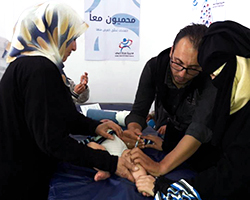WHO and health partners immunize hundreds of thousands of children in northern Syria

SIG
In the current context of conflict, ensuring that children in northern Syria are fully immunized is a major challenge. WHO and health partners based in Turkey have risen to this task, immunizing hundreds of thousands of children in the last 5 years and working to re-establish routine immunization services. However, many more children as well as adults in northern Syria are still at risk of vaccine-preventable diseases.
Immunization levels in Syria decreased from over 80% in 2010, prior to the conflict, to 43% in 2014. Routine immunization has been heavily disrupted by the conflict and by population displacement. This large gap in population immunity leaves Syrians vulnerable to preventable diseases, as the 2017 polio outbreak and the current outbreak of measles in northern Syria show. Insecurity, population movements, emergencies and lack of funding challenge the capacities of WHO and health partners to reach every child with immunization.
Joining forces to increase immunization coverage
Solid partnerships help address these challenges. “Strong and effective collaboration with the United Nations Children’s Fund (UNICEF), the Syria Immunization Group (SIG) and other health partners is a key success factor for WHO’s activities to increase immunization coverage of children in northern Syria,” says Dr Annette Heinzelmann, Emergency Coordinator at the WHO field office in Gaziantep, Turkey.
As a partner, WHO provides technical expertise to strengthen health and immunization capacities. It also supports operational costs for re-established vaccination centres in accessible areas of northern Syria and for supplementary immunization. UNICEF supplies vaccines and supports cold chain expansion as well as communication and social mobilization activities. SIG – a coalition of 22 nongovernmental organizations co-chaired by WHO and UNICEF – is the health partner that coordinates and implements all immunization activities in northern Syria.
A 2-tiered approach: risk-reduction campaigns and support to routine vaccination
In 2017 alone, WHO and health partners based in Gaziantep, Turkey, successfully rolled out several immunization campaigns in accessible areas of northern Syria to reduce the risks associated with the outbreak of circulating vaccine-derived poliovirus type 2 (cVDPV2) in north-eastern Syria. Five rounds of vaccination against poliomyelitis (polio) reached approximately 750 000 children under 5 years of age (multiple doses are needed for full protection). Vitamin A supplements, to strengthen the immune system and support the healthy growth and development of children, were also provided.
Campaigns continue in 2018 to protect against polio, respond to the measles outbreak and prevent other outbreaks; however, their full implementation is threatened by lack of funds. In addition, as of May 2018, about 80 vaccination centres have become operational and provide routine vaccination services in accessible areas of northern Syria, as part of the re-establishment of routine immunization services. By the end of 2018, it is planned to increase the number of centres up to 95 and expand their geographical coverage. Communication and social mobilization in the communities have played a crucial role in supporting successful vaccinations.
Protected together: commitment to immunization
As part of the European and World Immunization Week 2018, WHO, UNICEF, SIG and other partners came together in Gaziantep on 8 May 2018 to acknowledge the progress made so far towards improved access to quality immunization services for all young children in north-western Syria, and reiterate their commitment to immunization.
---
WHO’s immunization activities are kindly funded by the governments of Japan and Norway, the United States Agency for International Development (USAID), the European Commission's Humanitarian Aid and Civil Protection department (ECHO), and the United Kingdom’s Department for International Development (DFID).



